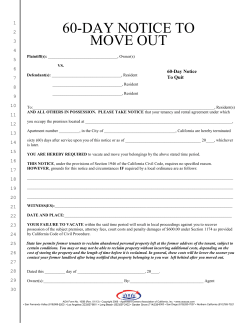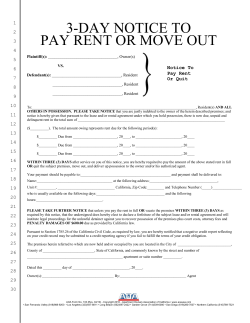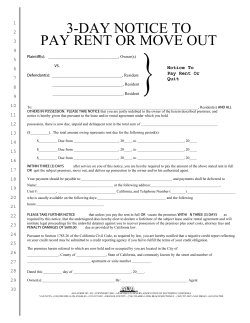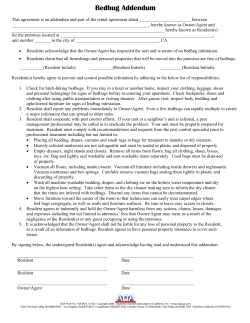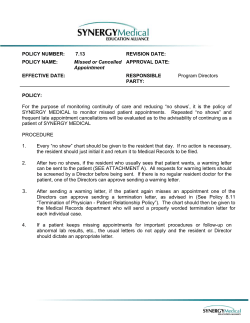
A Sample from the Quality Credentialing Program Toolbox
A Sample from the Quality Credentialing Program Toolbox Title Resident Elopement Policy for Assisted Living Facility Effective Date Policy I.D. (if applicable) Latest Revision Regulatory Authority s. 59A-5, Florida Administrative Code Approved by The Quality Credentialing Foundation disclaims responsibility for any adverse effects resulting directly or indirectly from the use of the sample tools including, but not limited to, undetected errors, and from the reader’s misunderstanding of the text. The Quality Credentialing Foundation exerted every effort to ensure that any Tools set forth in this text were in accord with current regulations, recommendations, and practice at the time of publication, but does not guarantee or warrant that this is so. Objective Facility administration and staff recognize that elopement poses a real danger to certain residents. The objectives of this policy are to define elopement, provide guidance in assessing and identifying residents or new admissions at risk for elopement, to prevent elopement, and to minimize harm if a resident does elope. Definitions Elopement - means an occurrence in which a resident leaves the facility without following policy and procedure, s. 58-5.0131 (14), FAC. Persons who elope differ from wanderers in that they are purposeful and may repeatedly attempt to leave. Wandering - meandering, aimless, or repetitive locomotion that may expose the individual to harm; may or may not be goal-directed. Admissions Our facility’s resident elopement response policy will be included in the admission package. All new admissions assessed as at risk for elopement will have a recent photo provided to, or taken by, the facility within 10 calendar days of admission. Florida Health Care Association - Florida Center for Assisted Living Page Resident Assessment All residents at risk for elopement or with any history of elopement shall be identified so staff can be alerted to their needs for support and supervision. At risk indicators include: • history of wandering /elopement • changes in mental status • cognitive impairments, including memory loss, decreased awareness, and disturbances in judgment, reasoning, and perception. • premorbid lifestyle factors; there is evidence that an active interest in music, social, and leisure activities may contribute to the tendency to wander (DW Thomas 1999); further, persons who have experienced life-threatening or stressful events in the past as well as persons who respond to stressful situations with more physicality are more likely to wander (Cohen-Mansfield 1991) • causes for restlessness, including the effects of medication and clinical diagnoses • depression • a functional assessment of communication ability, hearing, and gait General Policy & Procedure This facility shall make, at a minimum, a daily effort to determine that at risk residents have identification on their persons that include their name and the facility’s name, address, and telephone number. Staff attention shall be directed towards residents assessed at high risk for elopement, with special attention given to those with Alzheimer’s disease and related disorders assessed at high risk. If a current resident is assessed as a risk for elopement, the facility shall obtain or take a current photo and have it placed in the resident’s file within 10 calendar days of the assessment. [Augment policy with names or positions of first-tier and second-tier staff responsible for checking resident identification and the time of day such checks will take place. Include names of persons responsible for making sure the photograph gets in the resident’s file within 10 calendar days.] Record-keeping The facility will keep a current copy of the facility’s resident elopement policies and procedures in the facility records. The facility will also document the resident elopement response drills and maintain this documentation in the facility records. CITE POSITION will be responsible for ensuring that these records are in place. Resident Elopement Response Policy After X [enter time, i.e. 2 hours] in which a resident has not been accounted for, a resident shall be considered as having possibly eloped and the following procedure will be initiated: . CITE STAFF POSITION will check with the communications desk in the main lobby to determine if the resident reported their departure . If the resident did not sign out, immediately notify CITE STAFF POSITION (i.e. executive director and nurse on duty) 3. STAFF POSITION will check with Transportation; were there any unexpected appointments? 4. Designtated staff will begin a search for the resident in question, beginning with the resident’s apartment and fanning out on the floor Florida Health Care Association - Florida Center for Assisted Living Page 5. STAFF POSITION will notify Security. 6. STAFF POSITION will instruct Communications to put out a radio call to all staff carrying radios to search for the resident. The verbal radio code shall be “INSERT CODE”. 7. Expand the search to include all floors, the dining room, all common areas, the bathrooms, stairwells, roofs, laundry, basement. 8. Ensure that the rest of the facility’s residents remain safe while the search is being conducted. 9. If the resident once lived elsewhere on the property, check their old place of residence. 10. Staff will expand the search to include the surrounding grounds and neighborhood. . If the resident has not been found within CITE TIME (i.e. 30 minutes), the CITE POSITION will call 911, local law enforcement, and notify the resident’s family and the facility CEO or CITE POSITION. . Once local law enforcement arrives, report the elopement, and follow their instruction. 13. CITE POSITION will complete the initial adverse incident report using DOEA Form 31801024, dated October 2001, and send it to the Agency for Health Care Administration within 1 business day after the occurrence. The report will be sent by CITE POSITION by CITE METHOD OF TRANSMISSION (i.e. mail, fax, email). CITE POSITION will document this transmission in the facility records. 14. CITE POSITION will be the incident commander, coordinating facility efforts, directing action, facilitating communication, including communication with the family members. 5. When the resident is located, CITE POSITION will be responsible for notifying the family members, law enforcement, if necessary, and all other stakeholders. 6. CITE POSITION will have the Communications department send out a message to all radio holders that the resident has been located. The verbal radio code to transmit this message is “INSERT CODE” Drills All facility staff shall demonstrate an understanding and competency in the implementation of the elopement policies and procedures. Resident elopement drills shall be conducted twice a year. The administrators and direct care staff must participate in the drills which shall include a review of procedures to address resident elopement. Facilities must document the implementation of the drills and ensure that the drills are conducted in a manner consistent with the facility’s resident elopement policies and procedures. Participation in these drills shall be documented and kept in the staff records. Discrepancies and/or weaknesses revealed through the drills will be corrected. Staff Training All facility staff shall receive in-service training regarding the facility’s resident elopement policies within 30 days of employment. All staff shall be given a copy of our resident elopement policies and procedures. ## Florida Health Care Association - Florida Center for Assisted Living Page
© Copyright 2025
